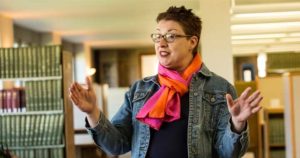The student has become the teacher, and a kind one at that.
In January, Cate Denial (pictured above), who earned her Master’s degree in history at UWM in 1996, returned to her alma mater to be the keynote speaker at UWM’s annual Teaching and Learning Symposium. The gathering brings together faculty and staff – some of whom are Denial’s old teachers and colleagues – for sessions and presentations aimed at sharing ideas about pedagogy.
“This was an opportunity to reconnect with a place that had had such a meaningful impact. UWM is the place I discovered I wanted to be a teacher. That was really special to me, to be able to make that connection,” she said.
Denial is the Bright Distinguished Professor of American History at Knox College as well as a pedagogy coach for teachers of all levels looking to revise their teaching styles. She’s also the author of a forthcoming book titled, A Pedagogy of Kindness (under contract with West Virginia University Press).
Kindness is central to Denial’s teaching philosophy, and she’s trying to spread the word. Her keynote address centered on the idea that teachers of all stripes can try to bring empathy into the classroom by working more collaboratively with their students as well as extending them a measure of grace – especially during a school year upended by a global pandemic.
“That’s why we invited Cate Denial as the keynote for the 6th annual UWM Teaching and Learning Symposium – because of her advocacy of a pedagogy of kindness. It is the right message at this time,” said Diane Reddy, psychology professor and the director of UWM’s Center for Teaching and Learning.
Arriving at kindness
Denial originally hails from England and did her undergraduate degree at the University of Nottingham, where she focused on American history. Upon graduating, she entered an exchange program that allowed her to attend UWM to earn her Master’s degree and teach classes.
“Suddenly, I’m in front of a class, and I have no idea what I’m doing,” Denial recalled. “What happened was that I repeated the worst offenses of my previous professors. My experience of university in England was incredibly hierarchical, very dismissive, very sexist, and deeply racist too.
“It was clear to me very quickly that that was not going to fly. It just didn’t work. I started experimenting in different ways to figure out how to do this better.”
She arrived at concept of kindness in 2017 when she attended the Digital Pedagogy Lab.
“The ethos of that conference was to take care of people. I came away from it thinking, I have to change a lot. So I did, massive amounts of things, and immediately saw a difference in the way I felt about teaching and the way my students responded,” Denial said.
Teaching in a troubled year
If student response to her methods has been positive in the past, it’s been especially welcome this past school year. As the COVID-19 pandemic forced many classes online, it also took a severe toll on students’ mental and physical health.
“Everybody is dealing with trauma – everybody,” she said. “I’ve seen that in every single student that I have. Some don’t have good wi-fi connections. They don’t have food. They’re struggling with housing. They are struggling because they are ill, or someone they love is ill, or they’ve lost someone that they love.”
Denial has said she’s seen the relief in her students’ faces when she agrees to give them a few extra days for a paper, and she’s ready to connect them to resources to support any struggles in their personal life. She’s giving them grace, and that’s exactly what she urged her former teachers to do as well when she addressed the Teaching and Learning Symposium.
“The take-aways from Cate’s pedagogy of kindness keynote – justice, believe students and believe in students – underscore the individual and collective actions undertaken by all of us at UWM during this pandemic,” Reddy said. “The keynote prompted us to take stock of our efforts and reinforced that we are doing right by our students.”
And really, you can’t go wrong if you try to be kind.
By Sarah Vickery, College of Letters & Science
